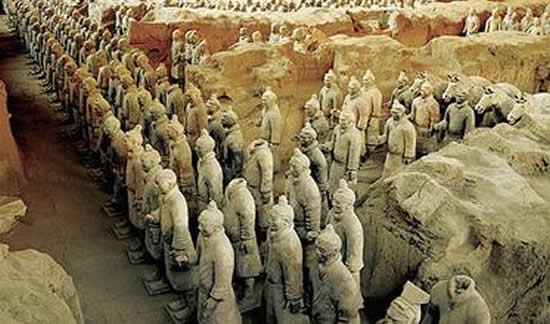(单词翻译:单击)
Archaeologists believe that the appearance of the Terracotta Warriors in the tomb of Qin Shi Huang, the first emperor of China was inspired by ancient Greeks, the BBC reported last Tuesday.
BBC上周二报道称,考古学家们认为中国第一位皇帝秦始皇陵墓中的兵马俑的出现,是受到了古希腊人的启发。
Ancient Greeks were even thought to have directly trained local artisans of the Qin Empire (221-206 BC).
他们甚至还认为古希腊人直接对秦朝(公元前221年——206年)的当地工匠展开了培训。
The latest finding broke the theory that the first direct contact between China and the west was through Marco Polo in the 13th century.
最近的发现打破了中西方之间的直接交流始于13世纪由马克·波罗为桥梁的这一理论。

"There is evidence that the earliest contacts between China and Europe was made before the opening of the ancient 'Silk Road'. It is much earlier than what the current record shows," said Li Xiuzhen, renowned archaeologist in the Emperor Qin Shi Huang's Mausoleum Site Museum.
秦始皇帝陵博物院著名考古学家李秀珍表示:“有证据表明,中欧之间最早的联系要在古'丝绸之路'开辟之前。这比当前显示的记录要早很长时间。”
The Terracotta Warriors in the tomb of Qin Shi Huang were discovered accidentally by a farmer in Lintong County, northwest China's Shannxi province in 1974.
秦始皇陵墓兵马俑是于1974年被一位农民在中国西北部陕西省临潼县偶然间发现的。
There was no tradition of building human statues as large as what is now known as the Terracotta Army before the Qin Empire, and a more reliable explanation of the phenomenon is that it is the result of foreign influence, according to Li.
根据李秀珍的说法,在秦朝之前并没有修筑兵马俑这么大的人物雕像的传统,还有更多可靠证据表明,这是受到国外影响的结果。


